- Home
- Robin McKinley
The Blue Sword d-1
The Blue Sword d-1 Read online
The Blue Sword
( Damar - 1 )
Robin Mckinley
Harry, bored with her sheltered life in the remote orange-growing colony of Daria, discovers magic in herself when she is kidnapped by a native king with mysterious powers.
This is the story of Corlath, golden-eyed king of the Free Hillfok, son of the sons of the Lady Aerin.
And this is the story of Harry Crewe, the Outlander orphan girl who became Harimad-sol, King's Rider, and bearer of the Blue Sword, Gonturan, the sword Lady Aerin carried, the sword only a woman may wield, for it will turn in the hand of a man.
Mythopoeic Fantasy Award for Adult Literature (nominee)
THE BLUE SWORD
Robin McKinley
To Danny and Peachey, who first led me to Damar.
CHAPTER ONE
She scowled at her glass of orange juice. To think that she had been delighted when she first arrived here—was it only three months ago?—with the prospect of fresh orange juice every day. But she had been eager to be delighted; this was to be her home, and she wanted badly to like it, to be grateful for it—to behave well, to make her brother proud of her and Sir Charles and Lady Amelia pleased with their generosity.
Lady Amelia had explained that the orchards only a few days south and west of here were the finest in the country, and many of the oranges she had seen at Home, before she came out here, had probably come from those same orchards. It was hard to believe in orange groves as she looked out the window, across the flat deserty plain beyond the Residency, unbroken by anything more vigorous than a few patches of harsh grass and stunted sand-colored bushes until it disappeared at the feet of the black and copper-brown mountains.
But there was fresh orange juice every day.
She was the first down to the table every morning, and was gently teased by Lady Amelia and Sir Charles about her healthy young appetite; but it wasn't hunger that drove her out of bed so early. Since her days were empty of purpose, she could not sleep when night came, and by dawn each morning she was more than ready for the maid to enter her room, push back the curtains from the tall windows, and hand her a cup of tea. She was often out of bed when the woman arrived, and dressed, sitting at her window, for her bedroom window faced the same direction as the breakfast room, staring at the mountains. The servants thought kindly of her, as she gave them little extra work; but a lady who rose and dressed herself so early, and without assistance, was certainly a little eccentric. They knew of her impoverished background; that explained a great deal; but she was in a fine house now, and her host and hostess were only too willing to give her anything she might want, as they had no children of their own. She might try a little harder to adapt to so pleasant an existence.
She did try. She knew what the thoughts behind the looks the servants gave her were; she had dealt with servants before. But she was adapting to her new life as best as her energetic spirit could. She might have screamed, and hammered on the walls with her fists, or jumped over the low windowsill in her room, clambered to the ground by the ivy trellis (special ivy, bred to withstand the desert heat, carefully watered by Sir Charles' gardener every day), and run off toward the mountains; but she was trying her best to be good. So she was merely first to the breakfast table.
Sir Charles and Lady Amelia were all that was kind to her, and she was fond of them after a few weeks in their company. They had, indeed, been far more than kind. When her father died a year ago, Richard, a very junior military adjutant, had laid the difficulty of an unmarried sister and an entailed estate before Sir Charles, and begged for advice. (She heard all this, to her acute embarrassment, from Richard, who wanted to be sure she understood how much she had to be grateful for.) He and his wife had said that they would be happy to offer her a home with them, and Richard, too relieved to think hard about the propriety of such a godsend, had written to her and said, Come out. He had not specifically said, Mind your manners, but she understood that too.
She hadn't any choice. She had known, because her father had told her five years ago when her mother died, that she would have no inheritance; what money there was was tied up very strictly for the eldest son. "Not that Dickie will mistreat you," their father had said, with the ghost of a smile, "but I feel that, with your temperament, you had best have as long as possible a warning to resign yourself to it. You'll like being dependent on your brother even less, I fancy, than you like being dependent on me." He tapped his fingers on his desk. The thought that lay silent between them did not need to be spoken aloud: that it was not likely she would marry. She was proud, and if she had not been, her parents would have been proud for her. And there is little market for penniless bluebloods of no particular beauty—especially when the blueness of the blood is suspected to have been diluted by a questionable great-grandmother on the mother's side. What the questionableness exactly consisted of, Harry was not sure. With the self-centeredness of childhood she had not thought to ask; and later, after she had realized that she did not care for society nor society for her, she had no desire to ask.
The shipboard journey east on the Cecilia had been long but uneventful. She had found her sea legs almost at once, and had made friends with a middle-aged lady, also traveling alone, who asked no personal questions, and loaned her novels freely to her young companion, and discussed them with her upon their return. She had let her own mind go numb, and had read the novels, and sat in the sun, and strolled the decks, and not thought about the past or the future.
They docked at Stzara without mishap, and she found the earth heaved under her strangely when she first set foot ashore. Richard had been granted a month's leave to meet her and escort her north to her new home. He looked younger than she had expected; he had gone overseas three years ago, and had not been Home again since. He was affectionate to her at their reunion, but wary; they seemed to have little in common any more. I shouldn't be surprised, she thought; it's been a long time since we played together every day, before Dickie was sent off to school. I'm an encumbrance now, and he has his career to think of. But it would be nice to be friends, she thought wistfully. When she pressed him to give her some idea of what she could expect of her new life, he shrugged and said: "You'll see. The people are like Home, you know. You needn't have much to do with the natives. There are the servants, of course, but they are all right. Don't worry about it." And he looked at her with so worried a face that she didn't know whether to laugh or to shake him. She said, "I wish you would tell me what is worrying you." Variations of this conversation occurred several times during the first days of their journey together. At this point there would be a long silence.
Finally, as if he could bear it no more, he burst out: "You won't be able to go on as you did at home, you know."
"But what do you mean?" She hadn't thought much about native servants, or her position, yet; and obviously Richard knew her well enough of old to guess that now. She had written him letters, several each year, since he had gone overseas, but he had rarely answered. She had not minded very much, although she had thought occasionally, as when his six hastily scrawled lines at Christmas arrived, that it would have been pleasant if he were a better correspondent; but it hadn't troubled her. It troubled her now, for she felt that she was facing a stranger—a stranger who perhaps knew too much about her and her accustomed way of life.
She blinked at him, and tried to rearrange her thoughts. She was excited, but she was frightened too, and Richard was all she had. The memory of their father's funeral, and she the only family member standing beside the minister, and of the small handful of servants and tenants whom she had known all her life and who were far away from her now, was still raw and recent. She didn't want to think about her new life; she wanted time to ease into it
gradually. She wanted to pretend that she was a tourist. "Dickie—Dick, what do you mean?"
Richard must have seen the homesick bewilderment on her face. He looked back at her unhappily. "Oh—er—it's not your house, you know."
"Of course I know that!" she exclaimed. "I appreciate what the Greenoughs are doing for you and for me by—by taking me in." And she added carefully: "You explained all that to me in your letter."
He nodded.
"Do you think I don't know how to behave myself?" she said at last, goaded, and was rewarded by another long silence while she felt the blood rising in her face.
"It's not that I don't think you know how," he said at last. She flinched, and he began: "An—"
"Harry," she said firmly. "It's still Harry." He looked at her with dismay, and she realized that she was confirming his fears about her, but she wasn't going to yield about that of all things. The realization that she would insist on being called Harry seemed to silence him, because he did not try to reason with her further, but withdrew into his corner seat and stared out the window.
She could tell by his voice that he did not want to hurt her, but that he was truly apprehensive. She and Richard had been wild animals together as small children; but when Dickie had been packed off to school, their mother had dragged her into the house, mostly by the ears or the nape of the neck, and begun the long difficult process of reforming her into something resembling a young lady.
"I suppose I should have started years ago," she told her sulky daughter; "but you were having such a good time, and I knew Dickie would be sent away soon. I thought it hardly fair that your lessons should start sooner." This lifted the cloud a little from her daughter's brow, so she added with a smile, "And, besides, I've always liked riding horses and climbing trees and falling into ponds better myself." After such an open avowal of sympathy from the enemy, lessons could never be quite awful; on the other hand, they were not perhaps as thorough as they might have been. On particularly beautiful days they often packed a lunch and rode out together, mother and daughter, to inspire themselves—the mother said—with a little fresh air; but the books as often as not stayed in the saddlebags all day. The daughter learned to love books, particularly adventure novels where the hero rode a beautiful horse and ran all the villains through with his silver sword, but her embroidery was never above passable; and she only learned to dance after her mother pointed out that such grace and balance as she might learn on the dance floor would doubtless stand her in good stead in the saddle. She learned the housekeeping necessary in an old ramshackle country house well enough to take over the management of theirs successfully during her mother's last illness; and the first horrible months after her mother's death were made easier by the fact that she had something to do. As the first pain of loss wore away, she realized also that she liked being useful.
In the shock five years later of her father's death, and with the knowledge that she must leave her home, and leave it in the indifferent hands of a business manager, it had occurred to her to be relieved that the little eastern station at the farthest-flung border of the Homelander empire where Richard had been posted, and where she was about to join him, was as small and isolated as it was. Her mother had escorted her to such small parties and various social occasions as their country neighborhood might offer, and while she knew she had "conducted herself creditably" she had not enjoyed herself. For one thing, she was simply too big: taller than all the women, taller than most of the men.
Harry could get nothing more useful out of her brother about his private misgivings as the small rickety train carried them north. So she began to ask general questions—a tourist's questions—about her new country; and then she had better luck. Richard began visibly to thaw, for he recognized the sincerity of her interest, and told her quite cheerfully that the town at the end of their journey, where Sir Charles and Lady Amelia awaited them, was the only town of any size at all within three days of it. "There's a wireless station out in the middle of nowhere where the train stops—it exists only for the train to have someplace to stop—and that's all." The town's name was Istan, after the natives' Ihistan, which was deemed too hard to pronounce. Beyond Istan was a scattering of small depressed cottages in carefully irrigated fields where a tough local tassel-headed grain called korf was grown. Istan had been a small village before the Homelanders came, where the farmers and herders and nomads from the surrounding country came to market every fortnight and a few pot-menders and rug-weavers kept shops. The Homelanders used it as an outpost, and expanded it, although the native marketplace remained at its center; and built a fort at the eastern edge of it, which was named the General Leonard Ernest Mundy.
Istan had lately become a place of some importance in the governmental network the Homelanders had laid over the country they had conquered eighty years before. It was still an isolated spot, and no one went there who didn't have to; for it was at the edge of the great northern desert of the peninsular continent the Homelanders called Daria. But thirteen years ago the Aeel Mines had been discovered in the Ramid Mountains to the northwest, and in the last eight years the Mines had been officially declared the most profitable discovery on the entire Darian continent, and that was saying a great deal. The profits on oranges alone paid the wages of half the civil servants in the Province.
"The Mines are awful to get to, though; the Ramids are very nasty going. Istan is on the only feasible route to the Mines, and is the last town large enough to re-supply any caravan or company going that way or coming back out again. That's why we got the railroad, finally. Before that we were the only reason anyone would want to come so far, and our attractions are limited. But the Mines are the big thing now. They may even figure out a way to dig a road through the Ramids. I wish them luck."
Istan also remained tactically important, for while south of it the boundary to Homelander territory swung rapidly east, the Homelanders failed to push it back any nearer the mountains of the north and east. The natives, perhaps from learning to cope with the desert to survive at all, had proved to be a tougher breed than their southern cousins.
Some of this Harry had read at Home when she had first heard of Richard's posting three years before. But she felt the reality of it now, with the western wind blowing down on her from the rich Aeel Mines, and the odd greenish-bronze tint in the sky, and the brilliant red of the sunsets. She saw the dull brown uniforms of the Homelander soldiers stationed here, with the red stripe vertically drawn over the left breast that indicated they served in the Darian province of the Homelander sovereignty. There were more soldiers, the farther they traveled. "It's still a sore point that Istan is the eastern frontier; we can't seem to bear the idea that the border doesn't run straight, north to south, because we would like it to. They keep threatening to mount new offensives, but Colonel Dedham—he's in charge of the old Mundy—says that they won't do it. And who wants to own a lot of desert anyway? It's the farmland in the south—and the Mines—that make it worthwhile to be here."
She encouraged him to talk about Her Majesty's Government of the Royal Province of Daria, and if she did not listen as closely as she might to the descriptions of the ranks and duties of the civil servants Richard had the most contact with, she arrived at Istan at last with some small idea of how Homelanders in general were expected to respond to Daria. And she had seen korf with her own eyes, and a band of the wandering tinkers known as dilbadi, and the changing color of the earth underfoot, from the southern red to central brown to northern yellow-grey. She knew a broad-leafed ilpin tree from the blue evergreen torthuk, and when Lady Amelia met her with a corsage of the little rosy-pink pimchie flowers, she greeted them by name.
Lady Amelia was a small round woman with big hazel eyes and curly grey hair and the wistful look of the fading beauty. Her husband, Sir Charles, was as tall as Richard and much broader; he must ride sixteen stone, Harry thought dispassionately as she shook his hand. He had a red face and white hair and a magnificent mustache, and if his blue eyes
were a little shallow, there were laugh lines generously around them, and his smile was warm. She felt as if they had looked forward to her coming, and she relaxed a little; there was none of the loftiness she was expecting toward a poor relation—someone else's poor relation at that. Sir Charles during the first evening gave her a complete history of Daria, its past, its conquest by the Homelanders, its present, and its likely future, but most of it she was too tired to follow. Lady Amelia's occasional quick comments, when her husband stopped to draw breath, about Harry's present comfort were much more welcome, although she tried not to show it. But midway through the evening, as Sir Charles was gesturing with his liqueur glass and even Richard was looking a bit glassy-eyed, Lady Amelia caught her new charge's eye for a long moment. A look of patience and affection passed between them; and Harry thought that perhaps all would be well, and she went up to bed in good spirits.
For the first few days in Istan she unpacked, and looked around her, and only saw the newness of everything. But the Homelanders of Istan were a small but thriving community, and she was the latest addition to a society which looked forward to, and welcomed, and cross-examined, and talked about, its additions.
She had always suffered from a vague restlessness, a longing for adventure that she told herself severely was the result of reading too many novels when she was a small child. As she grew up, and particularly after her mother died, she had learned to ignore that restlessness. She had nearly forgotten about it, till now. She wondered sometimes if her brother felt that impatience of spirit too, if something like it had had anything to do with his ending up at a small Border station, however tactically important, although his prospects, when he graduated from university, had suggested something better. This was one of the many things she did not ask him. Another question she did not ask was if he ever missed Home.

 Spindle's End
Spindle's End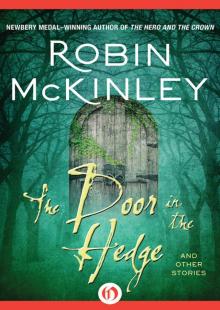 The Door in the Hedge: And Other Stories
The Door in the Hedge: And Other Stories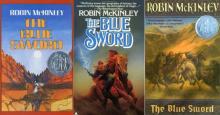 The Blue Sword
The Blue Sword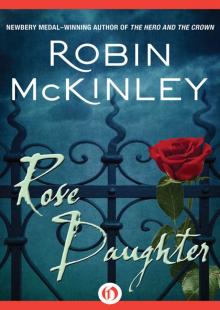 Rose Daughter
Rose Daughter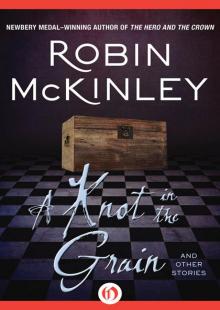 A Knot in the Grain and Other Stories
A Knot in the Grain and Other Stories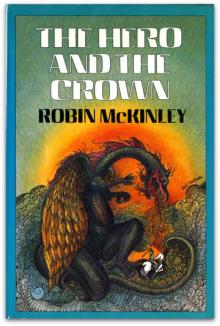 The Hero And The Crown
The Hero And The Crown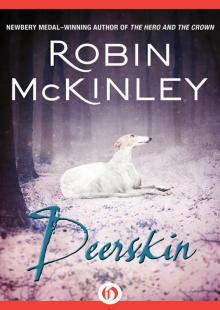 Deerskin
Deerskin Sunshine
Sunshine Beauty: A Retelling of the Story of Beauty and the Beast
Beauty: A Retelling of the Story of Beauty and the Beast Shadows
Shadows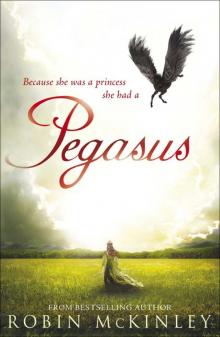 Pegasus
Pegasus Chalice
Chalice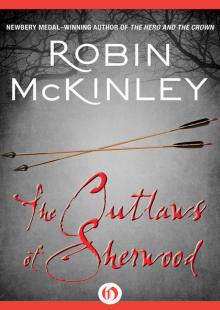 The Outlaws of Sherwood
The Outlaws of Sherwood Fire: Tales of Elemental Spirits
Fire: Tales of Elemental Spirits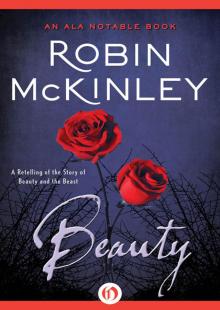 Beauty
Beauty Dragon Haven
Dragon Haven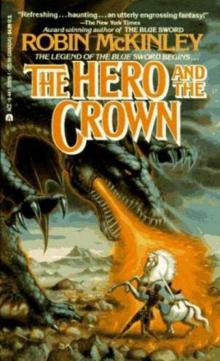 The Hero And The Crown d-2
The Hero And The Crown d-2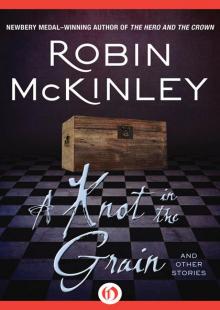 A Knot in the Grain
A Knot in the Grain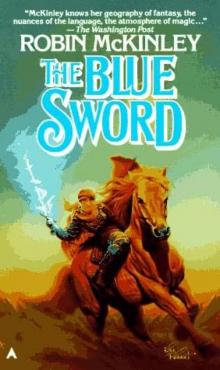 The Blue Sword d-1
The Blue Sword d-1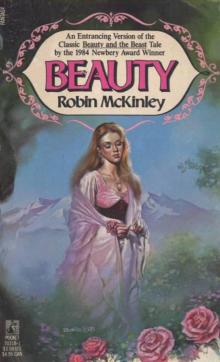 Beauty (v1.2)
Beauty (v1.2)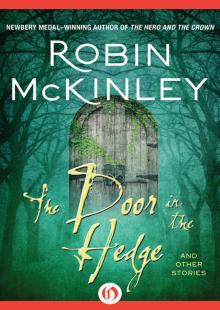 The Door in the Hedge
The Door in the Hedge